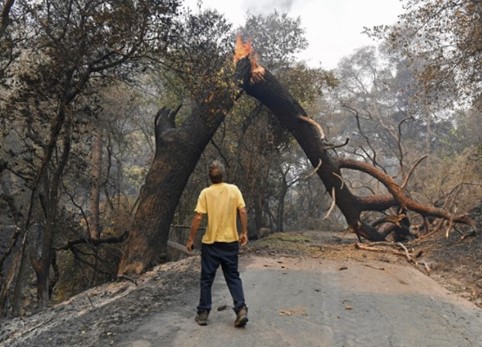
Wildfires Are Increasing Due to Climate Change, and Their Smoke Poses Serious Threats to Farmworkers, Study Reveals
In 2020, as wildfires ravaged vast areas of Sonoma County's wine country, Maria Salinas was still harvesting grapes amidst flying ash and smoke-choked air. Her saliva turned black from inhaling toxic fumes, and one day she struggled to breathe so severely that she was rushed to the emergency room. Despite this, she returned to work while the fires continued to burn.
"What drives us to work is necessity," Salinas said. "We always put ourselves in danger out of necessity, whether it's from fire, disaster, or extreme weather."
A new study highlights the heavy toll climate change is taking on farmworkers, who are increasingly exposed to harmful air pollution due to more frequent and intense wildfires. The research, focusing on Sonoma County, found that a program designed to determine safe working conditions during wildfires failed to adequately protect farmworkers. The study suggests implementing air quality monitors at work sites, stricter regulations for employers, emergency plans and training in multiple languages, post-exposure health screenings, and hazard pay.
Farmworkers are experiencing the worst effects of climate change firsthand, long before others realize the extent of the crisis, according to Max Bell Alper, executive director of North Bay Jobs with Justice, a labor coalition. "What we are witnessing in California is now happening across the country," he said during a webinar discussing the research, published in the journal GeoHealth.
Farmworkers often face immense pressure to work in hazardous conditions due to poverty and the fact that they are only paid for the hours they work. Those who are undocumented face additional challenges, such as limited English proficiency, lack of benefits, discrimination, and exploitation, making it harder to advocate for better working conditions.
Researchers analyzed data from the 2020 Glass and LNU Lightning Complex fires in Sonoma County, a region renowned for its wine. Many farmworkers continued to work during these fires, even in evacuation zones deemed unsafe for the general public. The urgency to harvest crops, particularly grapes that could be tainted by smoke, increased pressure on workers to remain in the fields.
The study compared air quality data from an EPA-operated AirNow monitor, used to alert the public to unsafe conditions, with 359 PurpleAir sensors installed by individuals. Between July 31 and November 6, 2020, the AirNow sensor recorded 21 days with air pollution levels deemed unhealthy for sensitive groups and 13 days of poor air quality unhealthy for everyone. The PurpleAir monitors reported 27 days of unhealthy air for sensitive groups and 16 days of air toxic to everyone.
Researchers also noted that smoke was sometimes worse at night, a time when some employers asked farmworkers to work due to cooler temperatures and supposedly less concentrated smoke, according to Michael Méndez, a researcher and assistant professor at the University of California-Irvine. "Hundreds of farmworkers were exposed to toxic air quality from wildfire smoke, which could have severe health consequences," he warned, noting the lack of post-exposure monitoring for these workers.
The study also scrutinized Sonoma County's Agricultural Pass program, which permits farmworkers and others in the agriculture industry to enter mandatory evacuation zones for essential activities like watering or harvesting crops. The research found that the approval process for these passes lacked clear standards, with applications often failing to include critical information, such as the number of workers on-site and detailed worksite locations.
Irva Hertz-Picciotto, a public health sciences professor at the University of California-Davis, who was not involved in the study, explained that symptoms of smoke inhalation—such as eye irritation, coughing, sneezing, and difficulty breathing—can start within minutes of exposure to fine particulate matter. Long-term exposure to these tiny particles, which can penetrate deep into the lungs and bloodstream, is linked to a higher risk of heart and lung disease, asthma, and other serious health conditions. The risks are even greater when combined with extreme heat. A recent study also found that inhaling wildfire smoke particulates could increase the risk of dementia.
Anayeli Guzmán, another farmworker who harvested grapes during the Sonoma County fires, recalled feeling fatigued and experiencing burning in her eyes and throat due to the smoke and ash. However, she never sought medical attention for post-exposure health issues. "We don't have that option," said Guzmán, who lacks health insurance. "If I went for a checkup, I'd lose a day's pay or be stuck with a medical bill."
During the webinar, Guzmán expressed frustration that vineyard owners seemed more concerned about grapes potentially being tainted by smoke than about the health of their workers. A farmworker health survey conducted in 2021 by the University of California-Merced and the National Agricultural Workers Survey found that fewer than 20% of farmworkers have employer-based health coverage.
Hertz-Picciotto emphasized that farmworkers are essential to the nation's food supply. "From both a moral and health standpoint, it's appalling that this situation has deteriorated so badly, and that measures have not been taken to protect farmworkers. This research is crucial in shedding light on the issue and providing real recommendations," she said.